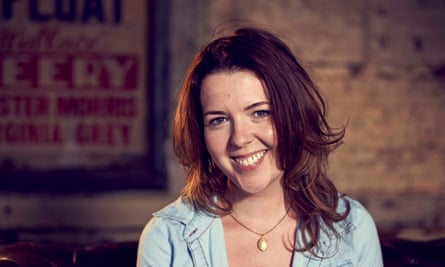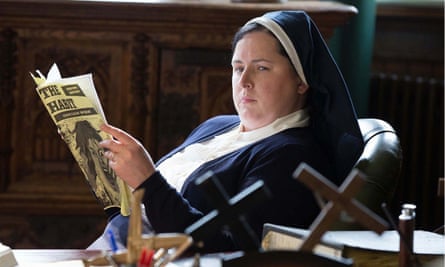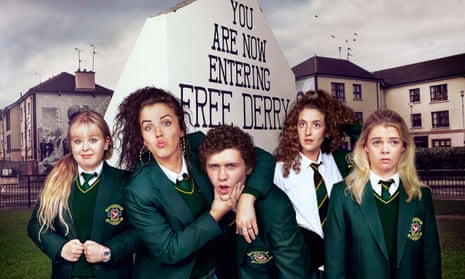What will we do on Thursday evenings now Derry Girls has ended? There will be no more excellent swearing from Michelle, no more cynicism from Sister Michael or stress-induced rants from Clare. There will be no more English boys being forced to wee into a bin thanks to a lack of male facilities at Our Lady Immaculate College. Well, no more for now; Derry Girls has been such a hit that Channel 4 has already ordered a second series.
The comedy is set in Derry (“or Londonderry, depending on your persuasion”) at the tail end of the Troubles in the 90s. Writer Lisa McGee has created a show that somehow basks in the nostalgia of 90s pop culture while depicting the reality, and frustration, of living in a city where life can be postponed at any second thanks to bomb threats. Or, as Clare’s dad Sean puts it in the first episode: “How long does it take to defuse a fecking bomb? Don’t the wee robots do all the work?”
Using the Troubles as a backdrop to a comedy isn’t so surprising – tragedy plus time equals comedy, after all – but what makes Derry Girls such a delight isn’t the politics or the nostalgia, it’s the way it expertly tells the story of four bolshy, funny, confused, rude schoolgirls (and one mainly confused schoolboy). And – most importantly – it is very, very funny.
It has been a long time since a sitcom captured the national mood and immediately left us impatient for the next instalment, then bereft at the end of its run. In an age in which half-hour comedies are often packaged in an online drop and left to sink or swim on Netflix or iPlayer, the return to traditional formatting arguably helped the show shore up its success. More than 2.8 million viewers tuned in to the first episode, making it Channel 4’s highest-rated comedy launch since Ricky Gervais’s Derek, five years ago. Throughout the series, sustained word of mouth has led to an average audience of 2.5 million an episode. For comparison, the first series of The Inbetweeners – the show with which Derry Girls shares a certain DNA – earned an average audience of 374,500.

The show is based on McGee’s childhood growing up in Derry, and the threat of violence lingers – although paramilitary kidnappings aren’t as worrying to the girls as a lack of funds for a school trip to Paris. As well as bombs causing traffic havoc (“I don’t know about you,” says Aunt Sarah, “but I’m not enjoying this bomb. I’ve an appointment at Tropicana at 12”), Uncle Colm has his van stolen by gun-runners and the girls’ school bus is regularly stopped by British soldiers. But even that drama is an excuse for teenage bawdiness. “Do you think if I told him I had an incendiary device down my knickers he’d have a look?” wonders Michelle.
For people in Northern Ireland, there has been a sense of relief that this time has been shown with authenticity, that there has been no diminishing its difficulty – but it has also been made absolutely clear that daily life went on, that people fell in love and fell about. As Twitter user RedMum explained in an eye-opening thread: “The Troubles were obviously on television a lot, and I remember feeling aggrieved that that’s all the media used to represent where I lived when it was so much more than that. I especially remember wondering why Belfast always looked stuck in 70s fashion.” (She adds that, after being caught up in a riot, she took a bullet home with her to prove to her mother why she’d failed to get back at the appointed hour. “The worry that I could have been burned alive paled in comparison to being discovered coming in late.”)
Derry Girls takes a format made famous by The Wonder Years and Everybody Hates Chris – a nostalgic look back at childhood in another era – and transposes this to the 90s. The nostalgia is perfectly pitched at those who laugh at the memory of Whigfield’s Saturday Night dance, permed hairstyles and floral wallpaper – and a younger audience who laugh at the idea any of that ever existed.
But nostalgia alone doesn’t explain why it has struck such a chord. There is a universality to the show: hands up who else has ordered from the chip shop with near-scientific instructions, or rustled up every clothing item going to avoid a sinful half-load? The show is an explosion of one-liners, delivered with Derry’s colourful vernacular. Michelle on the famine: “We got the gist. They ran out of spuds, everyone was raging.”
Then there’s Aunt Sarah insisting she’s psychic: “I am. I did a course, I got a certificate.” Or Michelle’s friendly advice to Erin: “You can’t ring Childline every time your mother threatens to kill you.”

Derry Girls also captures a trend for non-metropolitan comedy. This Country, following two friends from a Cotswolds village, and The Young Offenders (another show that was commissioned for a second series straight after the first episode aired) throw a light on the experiences of a young generation stuck in small towns. And there has been an increase in female-led comedy from Ireland at a time when female stories feel more important than ever. Twentysomething flatmate comedy drama Can’t Cope, Won’t Cope is a cult success on BBC Three, while Alison Spittle’s Nowhere Fast was well-received on RTÉ in Ireland; these follow Roisin Conaty’s GameFace, whose humour was influenced by her Irish upbringing.
The antics on The Inbetweeners showed that there is an appetite for schoolkid comedy, and that it is understood across ages and genders. That is clearly the case with Erin, Orla, Michelle, Clare and James from England, the lone boy at their all-girls’ school, whose low-level bullying by the other characters is the only real misstep of the series. But with some brilliantly delivered insults (“There’s times when I look at him and, well, it’s pure hatred. I’ll not dress it up,” says his aunt), we can’t stay angry for long.
McGee previously depicted life for Irish expats in the Channel 4 sitcom London Irish, and has explained that the challenge of Derry Girls came in “getting a balance between making it recognisable to the people of Derry, and understandable for everyone else”. Its popularity comes from the fact that she struck that balance expertly, and at a time when the politics of Northern Ireland have taken on a new relevance in Westminster; not only because the Democratic Unionist party has become the kingmaker in Downing Street, but because the question of an Irish border hovers over the fragile Brexit negotiations. Derry Girls shows the impact such a border would have, but through characters more wrapped up in boy troubles than the Troubles. Bring on series two.

Comments (…)
Sign in or create your Guardian account to join the discussion